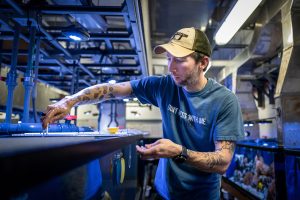
Dr. Gregory Barord of Central Campus has been selected by the United Nations for a team of experts on the state of the world’s oceans.
Earlier this month, we shared news that several students in the Marine Biology program at Central Campus became part of a national program through the National Oceanic and Atmospheric Administration (NOAA). Nine students were selected to participate in NOAA’s Ocean Guardian Youth Ambassadors program, which provides students with leadership and training opportunities to become effective, knowledgeable stewards of the National Marine Sanctuaries, and the ocean in general.
A thousand miles from the nearest ocean, it was another recognition for students in what is regarded as one of the top high school programs of its kind in the country.
Now their instructor – Dr. Gregory J. Barord – has been chosen to participate in an international effort, selected by the United Nations as part of a pool of experts for their Regular Process for Global Reporting and Assessment of the State of the Marine Environment. Started in 2002, the initiative aims to regularly review the environmental, economic and social aspects of the state of the world’s oceans, both current and foreseeable. Dr. Barord will be working with the “Cephalopod Team”, as his research focus and expertise lies in the biology, behavior, and conservation of nautiluses, octopuses, squid, and cuttlefish.
For his students, Dr. Barord will have a lot to share from his UN work.
“I will be able to share that with them so they can see another way that scientists work together with other scientists, from around the world, to focus on global issues,” said Barord. “Students will also be able to see a connection between scientific work and socioeconomic outcomes.”
He also expects that by working with other scientists from around the world, this will mean even more opportunities to invite them to lecture to his classes.
“In the classroom, my work will provide another perspective from which to discuss local issues here in the Des Moines area within a broader context of their connections to the world,” added Barord. “Science can inform socioeconomic solutions, and vice versa, both at the world level but also at our local level.”
Dr. Barord’s new work with the United Nations is in addition to several other affiliations he has that brings new knowledge and experience to Central Campus and Des Moines Public Schools. That includes his affiliation as a research scientist with the American Museum of Natural History, a Conservation Biologist with Save the Nautilus, a member of the International Union for Conservation of Nature Species Survival Commission Mollusc Specialist Group, and work with the United States Endangered Species Act and the Convention on International Trade in Endangered Species.





